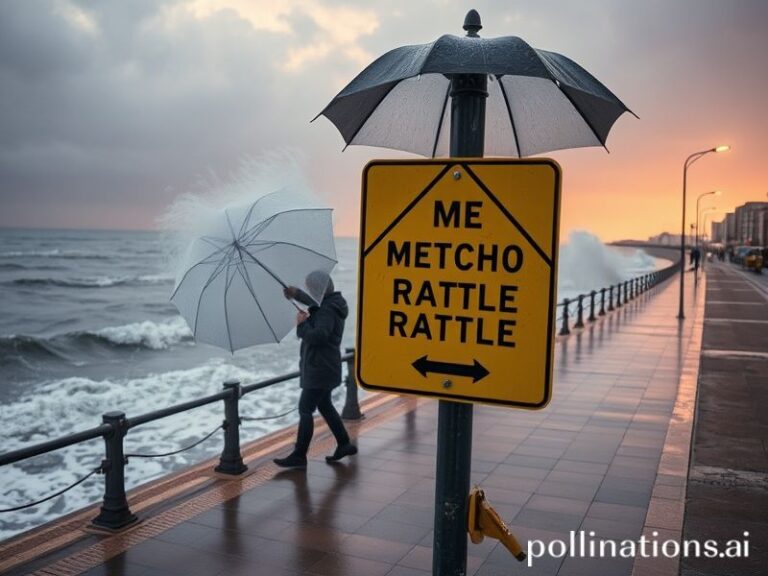FNMA Stock: How a Zombie U.S. Mortgage Giant Became the World’s Favorite Political Hostage
FNMA Stock: A Global Ghost Story in Government Pajamas
by Diego Márquez, Senior Correspondent, Somewhere Between Frankfurt and a Frequent-Flyer Lounge
It’s 3 a.m. in Singapore. A Norwegian pension fund manager is refreshing her terminal, half-expecting the coffee to taste like solvent and half-hoping that FNMA—Fannie Mae to its drinking buddies—has finally decided whether it is a public charity, a private casino, or the world’s most heavily leveraged mood ring. Halfway around the planet, the same ticker flickers in Lagos, Mumbai, and a basement in Reykjavik where someone’s cousin is convinced 2008 was merely a rehearsal. The international takeaway? When Washington sneezes, the entire planet still catches the ideological flu.
Fannie Mae, along with its sibling Freddie Mac, was nationalized in that cheerful autumn of 2008 when Lehman Brothers discovered gravity and AIG learned that insurance is just a promise with better marketing. Sixteen years on, FNMA remains in government “conservatorship,” a word that sounds like a gentle spa retreat but behaves more like an indefinite hostage situation. The U.S. Treasury sweeps nearly all profits into its own coffers each quarter—an arrangement politely called the “net worth sweep,” which, translated from bureaucratic into human, means “thanks for the dividend, now kindly freeze in limbo.”
Global investors, never ones to let existential uncertainty spoil a good momentum trade, keep the stock on life support. Hedge funds from Hong Kong to the Caymans circle like well-tailored vultures, betting that some future administration will rediscover the rule of law and release Fannie back to its rightful owners. The thesis is simple: American mortgages are the world’s safest debt, America loves home ownership more than it loves coherent fiscal policy, therefore the cash cow must eventually be unshackled. That syllogism has sustained lawsuits, lobbying campaigns, and a thousand conference calls in which the word “litigation” is pronounced with the same reverence other cultures reserve for “apocalypse.”
Yet the global stakes stretch well beyond U.S. suburbia. European banks park excess dollars in agency mortgage-backed securities because parking them in European sovereign debt feels like storing gasoline next to a barbecue. Japanese insurers, starved for yield at home, treat FNMA-guaranteed paper as the financial equivalent of comfort food. When Washington toys with reform—floating plans to merge Fannie and Freddie into a single utility, or to replace them with 50 state-chartered mini-Fannies—bond desks from Toronto to Zurich recalibrate duration risk faster than you can say “systemically important.” In other words, if FNMA sneezes, the world’s carry trade develops pneumonia.
Emerging markets watch the saga with the detached amusement of people whose own currencies have been held hostage by Washington Consensus economists for decades. Brazilian analysts call the conservatorship “Quantitative Easing’s awkward cousin who never leaves the couch.” South African traders joke that the Fed’s balance sheet is basically an exotic derivative on U.S. housing policy—except you can’t short it without relocating to a non-extradition country.
Meanwhile, the stock itself—technically worthless if the sweep continues—inhabits the twilight zone where retail day traders in Seoul can still push it 40% on a rumor that a federal judge looked mildly sympathetic during oral arguments. CNBC Asia flashes headlines like “Fannie Mae: Moonshot or Metaphor for Late-Stage Capitalism?” The answer, of course, is yes.
Dark humor aside, the episode illustrates a larger pathology: the globalization of moral hazard. When the world’s reserve currency backstops a housing market, and that backstop is itself backstopped by ad-hoc legal improvisation, the concept of risk becomes decorative—like putting a seatbelt on a roller-coaster that runs through an active volcano. Everyone pretends the rules will eventually clarify; everyone privately books another gain before the next administration tweets a policy reversal at 5:07 a.m. Eastern.
So what happens next? A decade from now the grandchildren of today’s traders may still be refreshing their terminals, waiting for the U.S. government to decide whether FNMA is a utility, a cash machine, or a perpetual motion device powered by lobbyists and nostalgia. Until then, the stock remains the world’s most expensive lottery ticket, redeemable only if the American political system spontaneously develops both memory and shame—an outcome that, to put it gently, is not yet priced in.







